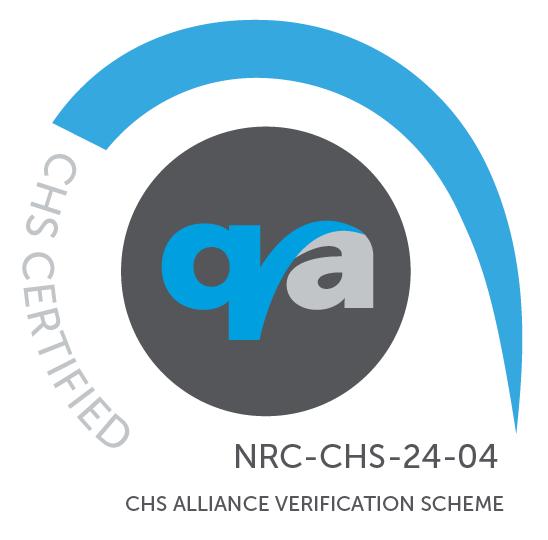The CHS is a globally recognised, measurable standard. Certification indicates that NRC is compliant with the nine CHS commitments. The commitments state that people and communities in situations of crisis and vulnerability:
- can exercise their rights and participate in actions and decisions that affect them
- access timely and effective support in accordance with their specific needs and priorities
- are better prepared and more resilient to potential crises
- access support that does not cause harm to people or the environment
- can safely report concerns and complaints and get them addressed
- access coordinated and complementary support
- access support that is continually adapted and improved based on feedback and learning
- interact with staff and volunteers that are respectful, competent and well-managed
- can expect that resources are managed ethically and responsibly
Additionally, NRC is dedicated to addressing any identified non-conformities.
From December 2023 to October 2024, NRC underwent the first audit of a three-year certification cycle. During this initial audit, the auditors reviewed our policies and conducted interviews with staff, partners and communities at selected country offices.
NRC's certification is currently valid until 2027. This means we are authorised to describe ourselves as a CHS-certified organisation for the duration of this period.
Earning CHS certification enables us to participate in continuous learning and enhancement, putting the communities and people affected by displacement at the heart of everything we do.
This rigorous assessment provides stakeholders with greater assurance that we are delivering humanitarian assistance in a way that ensures quality and accountability for the people we serve.

Read more about our certification – on the HQAI website
About the Core Humanitarian Standard (CHS)
- The Core Humanitarian Standard (CHS), launched in 2014, outlines nine essential commitments that organisations and individuals involved in humanitarian responses can follow to enhance the quality and effectiveness of the assistance they provide.
- It promotes greater accountability to communities and individuals affected by crises, ensuring they understand what to expect from humanitarian organisations and how to hold these organisations accountable.
- The CHS also aims to uphold the wellbeing, rights, and protection of those affected by crises, placing them at the centre of humanitarian action.
- The certification process is overseen by an accredited third-party auditing organisation called the Humanitarian Quality Assurance Initiative (HQAI). HQAI offers independent and impartial verification that an organisation consistently meets the standard's requirements throughout a three-year period.

